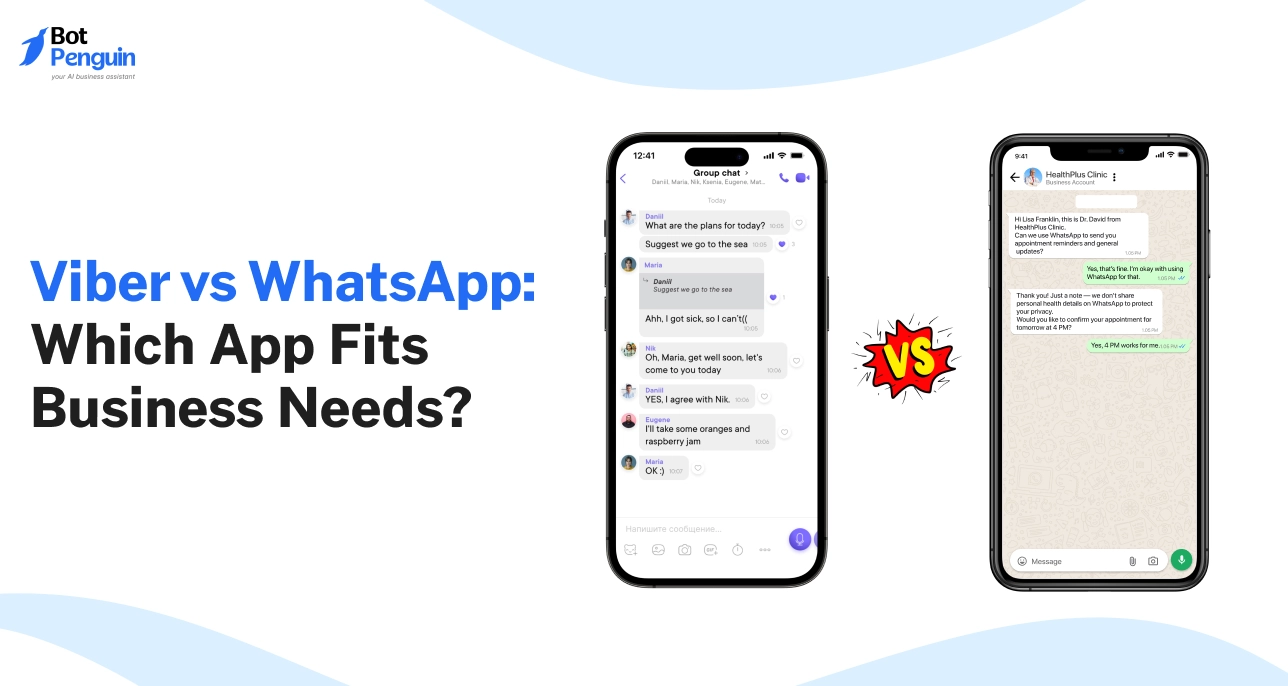Your customers are not calling anymore. They are chatting.
Messaging has become the new language of business. From customer support to marketing, every meaningful interaction now happens in real time through chat apps.
Among the many options, Viber and WhatsApp stand out as the top choices for business communication. Both offer reach, speed, and privacy but serve different goals.
This guide explores Viber vs WhatsApp in detail, covering security, users, privacy, image quality, and automation to help you choose the platform that best fits your business needs.
WhatsApp vs Viber Overview
Messaging platforms now define how businesses communicate, market, and support customers. Both WhatsApp and Viber have developed dedicated business solutions that go far beyond basic chat.
Understanding how these platforms operate helps companies choose the right one for customer engagement, automation, and regional communication in 2025.
WhatsApp for Business Overview
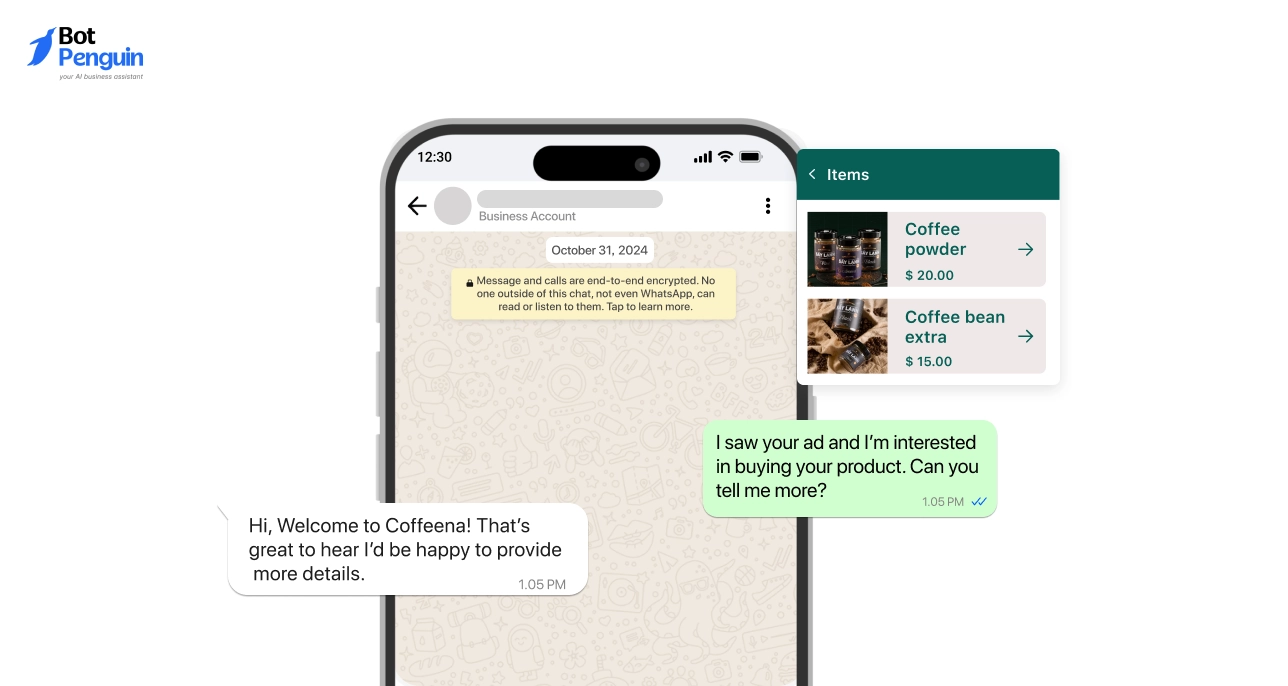
1. Two Distinct Versions
- WhatsApp Business App is designed for small businesses that manage limited customer interactions. It enables quick replies, labels for organizing chats, and auto-greetings to keep customers informed.
- WhatsApp Business API serves medium and large enterprises that require automation, workflow management, and secure, verified communication at scale.
2. Core Functionalities
- Automation: Businesses can set automatic responses for FAQs, integrate chatbots, and send notifications instantly.
- Catalogs: Companies can list products or services within the chat window, allowing customers to browse and order directly.
- Broadcast Campaigns: Useful for announcements, updates, and seasonal promotions. Messages can reach thousands simultaneously with minimal manual effort.
- CRM Integration: Through platforms like HubSpot, Zoho, and Salesforce, WhatsApp helps teams track leads, assign chats, and log customer data automatically.
3. Enterprise Preference
Most large organizations prefer WhatsApp Business API for its global reliability, verified business accounts, and built-in compliance standards.
For industries that demand automation and secure data handling, such as banking, retail, and healthcare, WhatsApp remains a proven choice.
Viber for Business Overview
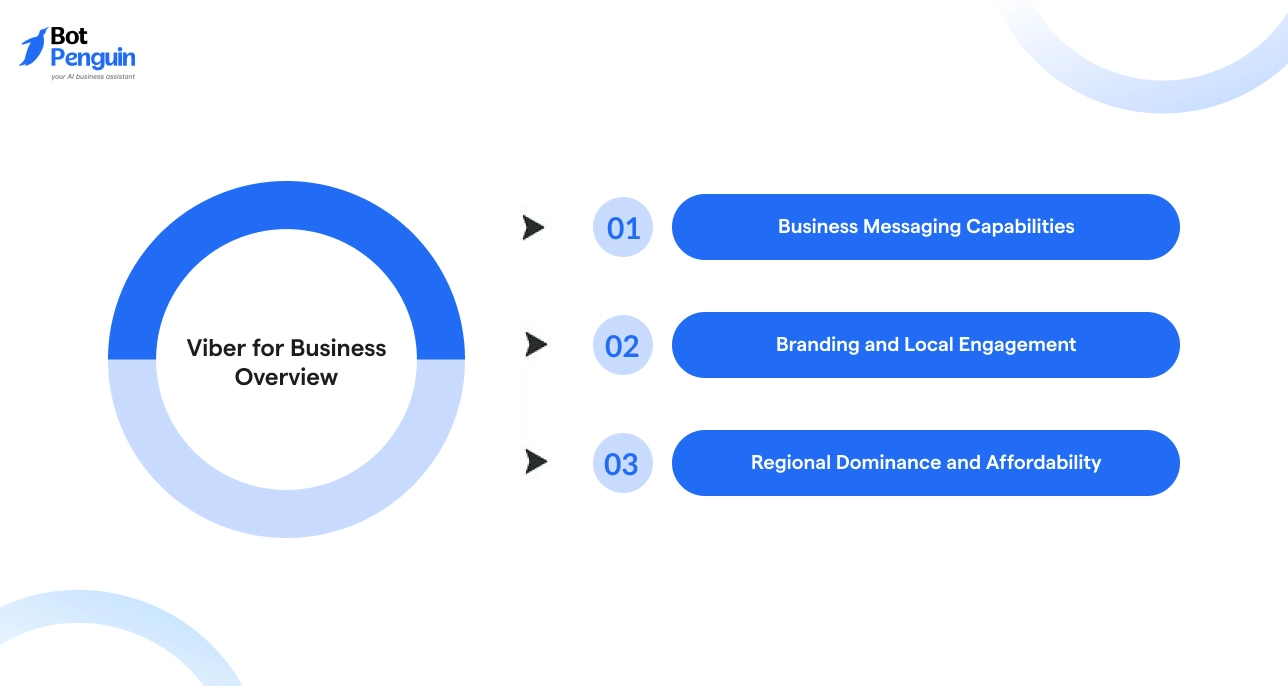
1. Business Messaging Capabilities
- Viber Business Messages allows brands to send three main message types — transactional, promotional, and conversational. This helps maintain consistency in communication while managing sales, updates, and feedback through one channel.
- Viber Chatbots let companies automate customer support and handle queries in real time, improving response speed and customer satisfaction.
- Viber Out extends communication reach by enabling businesses to contact users who do not have Viber installed, ideal for hybrid customer bases.
2. Branding and Local Engagement
Viber places heavy emphasis on brand identity and community. Businesses can use custom stickers, public communities, and localized campaigns to strengthen brand recall and encourage engagement.
This approach works well for lifestyle, retail, and event-based brands that focus on interaction rather than scale.
3. Regional Dominance and Affordability
Viber for Business continues to hold strong in Eastern Europe, the Middle East, and Southeast Asia.
Its pay-per-delivery pricing model ensures companies pay only for messages successfully received, making it cost-effective for marketing-heavy operations. For small and mid-sized enterprises focused on affordability and local reach, Viber provides strong ROI and flexibility.
Both platforms empower businesses to connect and convert, but their strengths differ. WhatsApp offers scalability, verified automation, and strong API support for enterprises with large audiences. Viber stands out for affordability, regional presence, and creative brand engagement.
The next section compares their user base and global reach, revealing which platform aligns better with different markets.
Viber vs WhatsApp Quick Comparison for Businesses
Takeaway:
- Choose WhatsApp if your business values automation, verified communication, and international scale.
- Choose Viber if your focus is cost-effective marketing, localized campaigns, and customer engagement within regional markets.
To understand more, let's talk about the major features that matter in detail.
Features That Matter for Businesses
Choosing between WhatsApp and Viber comes down to understanding their practical business features.
Both platforms help companies automate communication, run marketing campaigns, and manage customers efficiently.
However, the tools and approach they offer differ significantly. Here’s how each platform supports business communication in 2025.
WhatsApp Business Features
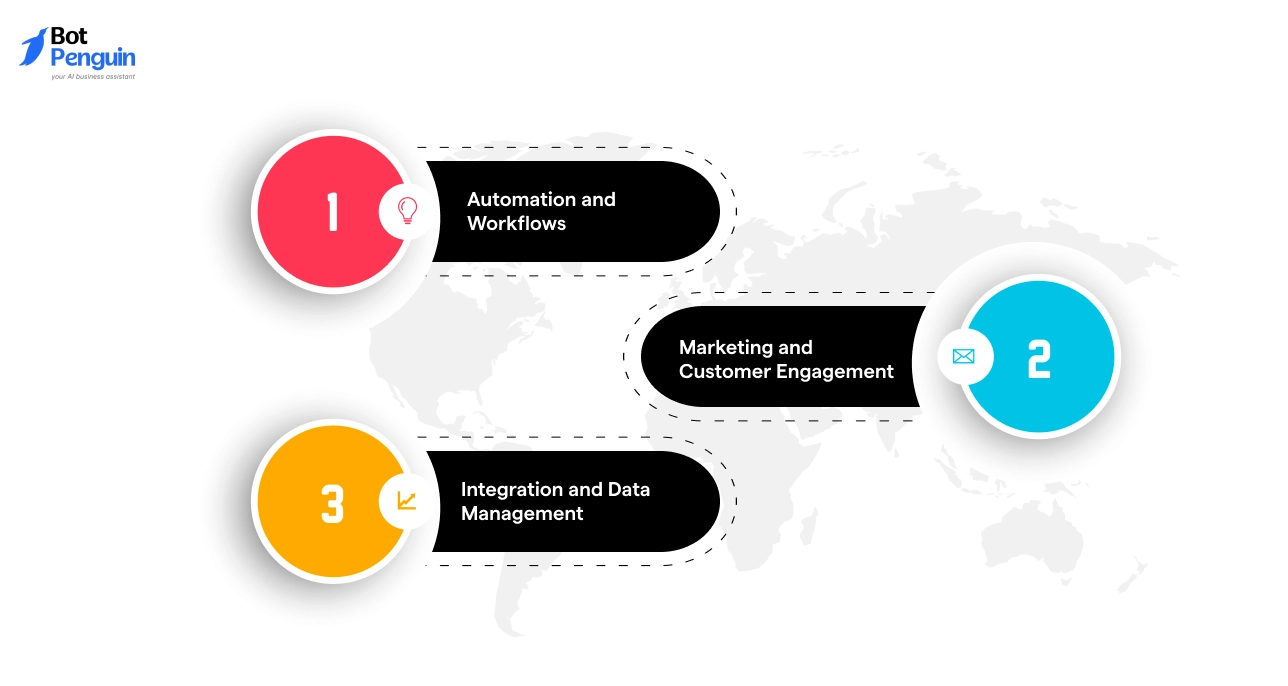
1. Automation and Workflows
- WhatsApp automation allows businesses to reply instantly and manage high message volumes without manual input.
- Through chat templates, quick replies, and message workflows, companies can handle repetitive queries and confirmations easily.
- Example: An online store can send order updates, shipping details, or payment alerts automatically to customers.
2. Marketing and Customer Engagement
- Businesses can create catalogs displaying products directly in chat.
- Promotional messages and personalized notifications enable targeted engagement.
- Example: A service provider can remind customers of appointments or offer limited-time discounts through broadcast campaigns.
3. Integration and Data Management
- WhatsApp business tools connect with CRM platforms such as HubSpot, Zoho, and Salesforce.
- This integration helps teams log conversations, assign leads, and analyze customer data.
- For enterprises, it ensures communication is automated, traceable, and aligned with marketing objectives.
Why Businesses Choose WhatsApp
Enterprises prefer WhatsApp Business API for its verified accounts, scalability, and reliability across global markets.
Viber Business Features
1. Automation and Chatbots
- Viber chatbots handle customer queries, booking confirmations, and FAQs automatically.
- This feature helps small and mid-sized businesses offer round-the-clock assistance withut expanding support teams.
- Example: A food delivery brand can confirm orders or share delivery status using automated Viber messages.
2. Branding and Community Engagement
- Custom stickers, public communities, and promotional banners help brands increase visibility and build a loyal audience.
- Businesses can host interactive campaigns or local events directly within Viber groups to keep customers engaged.
- This makes Viber effective for lifestyle, retail, and entertainment-based marketing.
3. Affordability and Campaign Reach
- Viber’s pay-per-delivery model ensures businesses pay only for successfully delivered messages.
- This cost-efficient model suits regional marketing and frequent promotional outreach.
- Combined with strong local adoption, it delivers high engagement at lower cost.
Why Businesses Choose Viber
Companies focused on regional reach, creative campaigns, and cost-effective messaging often find Viber for Business the more practical option.
Viber vs WhatsApp: Number of Users
Audience size directly affects how far a business message can travel. Understanding where each app holds dominance helps companies decide where their communication and marketing will perform best.
Both WhatsApp and Viber have large user bases, but their market presence differs across regions.
1. WhatsApp’s Global Presence
- WhatsApp has over 2 billion active users worldwide, making it the most used messaging platform for business communication.
- It dominates in India, Latin America, and Africa, where customers rely on it for daily interactions and transactions.
- For businesses targeting international audiences, WhatsApp Business API offers reliable delivery and global accessibility.
- Example: A retail brand expanding to multiple countries can maintain one communication system using WhatsApp without needing regional adjustments.
2. Viber’s Regional Popularity
- Viber has around 260 million active users, concentrated in Eastern Europe, the Middle East, and the Philippines.
- In these markets, Viber is a preferred channel for business promotions, customer engagement, and community interaction.
- Its popularity in these regions gives small and mid-sized businesses a cost-effective way to reach audiences that respond better to Viber for Business than to global platforms.
- Example: A local restaurant chain in Serbia can share offers, updates, and order confirmations directly through Viber, where most customers are active daily.
3. Why User Distribution Matters
- Choosing between Viber vs WhatsApp depends largely on where your customers are.
- Businesses with global operations benefit from WhatsApp’s reach, while regional companies gain higher engagement through Viber’s localized networks.
- Understanding this split helps businesses plan marketing budgets, improve delivery rates, and select the right automation and messaging strategy.
Viber vs WhatsApp Privacy
Privacy remains a decisive factor when businesses choose a messaging platform.
As data protection laws become stricter and customers become more aware of how their information is used, companies must rely on platforms that prioritize secure and transparent communication.
Both Viber and WhatsApp claim to protect user data, but their privacy practices differ in ownership, data handling, and regulatory compliance.
1. Ownership and Data-Sharing Policies
- Viber operates independently under Rakuten and does not share user data with any parent company or third-party advertisers. It positions itself as a privacy-first platform where business interactions remain within the chat environment.
- WhatsApp, on the other hand, is part of Meta’s ecosystem, meaning certain metadata such as device type, contact information, and usage activity can be used within Meta’s broader business network. Although message content is end-to-end encrypted, the platform still collects limited data to improve services and advertising relevance.
Example: A business using WhatsApp Business API may rely on Meta’s systems for analytics and ad targeting, while a company using Viber for Business keeps all customer interactions confined to Viber’s infrastructure.
2. Encryption and Transparency
- Both apps use end-to-end encryption, ensuring messages are readable only by the sender and recipient.
- However, Viber enables encryption across all personal and group chats by default and allows users to verify encrypted sessions manually.
- WhatsApp provides the same protection but relies on optional encrypted backups, which may expose user data if stored outside the app environment.
This distinction matters for businesses that handle sensitive client or financial data, as Viber’s automatic encryption and limited data exposure provide stronger confidentiality by default.
3. Compliance with Global Privacy Standards
- Viber adheres to GDPR compliance, maintaining clear policies on data collection, retention, and user consent. Businesses using the platform can assure customers that their data is not processed beyond service requirements.
- WhatsApp also complies with GDPR but faces additional scrutiny due to Meta’s advertising framework, which may raise questions about long-term data usage.
Key Differences Between Viber and WhatsApp
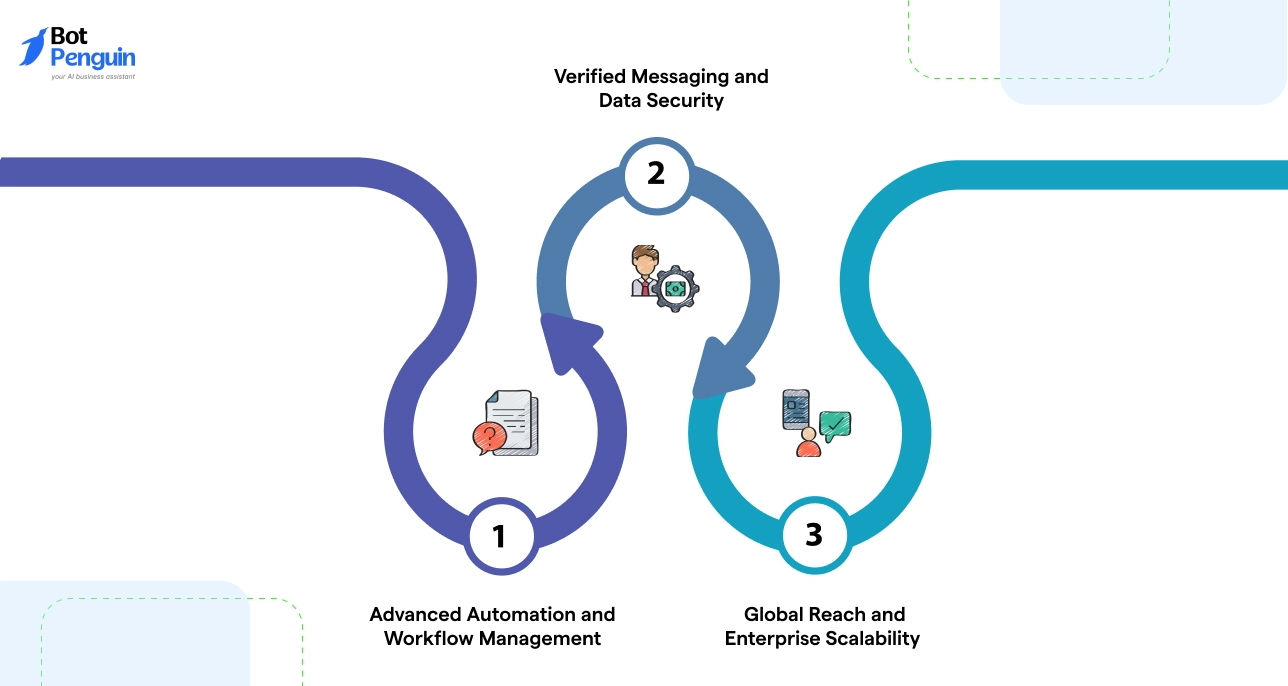
After comparing features such as privacy, data efficiency, and image quality, the next step is understanding how these two platforms differ overall.
Both Viber and WhatsApp serve the same purpose of connecting businesses with customers, yet their operational focus, pricing, and technical structure set them apart.
Knowing these Viber vs WhatsApp differences helps businesses identify which platform fits their customer base, budget, and communication strategy best.
1. User Base and Global Reach
- WhatsApp leads with more than 2 billion users worldwide. It is the go-to platform in countries such as India, Brazil, and across Africa, making it ideal for businesses seeking international reach.
- Viber has about 260 million active users, with dominance in Eastern Europe, the Middle East, and parts of Asia. For companies targeting these regions, Viber offers stronger engagement.
2. Automation and Business Tools
- WhatsApp supports enterprise-level automation through its Business API. Features such as automated replies, chat templates, and CRM integrations make it suitable for large organizations.
- Viber relies on chatbots to manage automation. While simpler than WhatsApp’s setup, it works well for small businesses that need basic automation for customer support and promotions.
3. Cost and Scalability
- WhatsApp follows a session-based pricing structure, which can be costly for frequent, high-volume messaging. However, it scales efficiently for global operations.
- Viber operates on a pay-per-delivery model, offering better cost control for localized marketing and frequent promotional messages.
4. Security and Privacy
- Both platforms use end-to-end encryption, but Viber has stricter privacy practices as it does not share data within a larger ecosystem.
- WhatsApp, part of Meta, offers strong encryption yet collects limited metadata to support service functions.
5. Marketing and Engagement
- WhatsApp focuses on structured campaigns through templates and catalogs, suited for transactional and customer support communication.
- Viber emphasizes creative engagement through communities, stickers, and promotional banners, making it a preferred option for branding-focused businesses.
When Viber Better is Than WhatsApp
Both platforms serve different purposes, and the answer depends on what a business values most.
While WhatsApp focuses on automation and scalability, Viber offers advantages in localized engagement and cost efficiency. For small and mid-sized businesses targeting specific regions, Viber for Business can often outperform WhatsApp in reach and customer interaction.
1. Strong Local Marketing Capabilities
Viber performs best in regional markets such as Eastern Europe, the Middle East, and Southeast Asia. Its strong local adoption means customers are already familiar with the app, making message delivery more effective.
Businesses can run hyper-local marketing campaigns through Viber Business Messages, promoting events, discounts, or service updates directly to active local audiences.
Example: A small travel agency in the Philippines can promote seasonal offers to nearby customers without spending heavily on ads, achieving higher conversion rates through direct chats.
2. Affordable Outreach and Pay-Per-Delivery Model
One of Viber’s biggest strengths is its pay-per-delivery pricing structure. Businesses only pay when messages reach customers successfully, keeping marketing costs predictable and low.
This is especially beneficial for startups or regional companies running frequent promotional campaigns. It also makes Viber a cost-effective option for bulk notifications, updates, and feedback messages.
3. Community and Brand Engagement
Viber business marketing tools allow brands to build communities where users can interact, share feedback, and stay updated. Features like custom stickers, public groups, and branded messages give companies creative ways to connect with their audience.
These features make Viber ideal for lifestyle, entertainment, and retail brands that depend on community-driven engagement rather than automated workflows.
When WhatsApp Better Than Viber
For organizations that focus on scalability, automation, and verified communication, WhatsApp for Business holds a clear advantage.
Its structured tools and enterprise support make it the preferred platform for global brands managing customer interactions at scale.
1. Advanced Automation and Workflow Management
Through the WhatsApp Business API, companies can automate thousands of conversations efficiently. Chat templates, notifications, and integrated chatbots streamline routine processes such as booking confirmations, payment updates, and product inquiries.
Businesses handling high message volumes can ensure consistent service quality with minimal manual effort.
2. Verified Messaging and Data Security
WhatsApp offers verified business profiles that help establish trust and credibility. Customers can identify legitimate businesses instantly, reducing the risk of impersonation or fraud.
Additionally, end-to-end encryption and Meta’s regular compliance audits ensure secure business communication, especially for industries handling sensitive information such as finance or healthcare.
3. Global Reach and Enterprise Scalability
With over two billion active users, WhatsApp provides unmatched coverage across markets in Asia, Africa, and Latin America. It integrates with CRMs like HubSpot and Salesforce, allowing businesses to centralize communication and data management.
This global reliability makes WhatsApp for Business an essential platform for large enterprises that need consistent performance and analytics across regions.
WhatsApp vs Viber Which Is Better for Your Business
Choosing between WhatsApp and Viber depends on the nature of a business, its target market, and communication priorities. Both platforms enable brands to automate communication, engage customers, and run marketing campaigns, but they perform best in different scenarios.
The right choice comes down to whether a company values scale and automation or cost efficiency and localized engagement.
1. When WhatsApp is the Better Choice
- WhatsApp is ideal for businesses with international audiences that need consistent and automated customer communication.
- Its verified profiles build trust, and the WhatsApp Business API supports advanced automation, workflow creation, and CRM integration.
- Large organizations can manage thousands of conversations daily, ensuring reliability and compliance across regions.
- Example: A logistics company with clients in multiple countries can use WhatsApp to send delivery alerts, payment confirmations, and updates through automated workflows.
Key advantages of WhatsApp include:
- Global user base of over 2 billion
- Verified business accounts and data encryption
- Integration with CRMs like HubSpot, Zoho, and Salesforce
- Consistent performance in regions with limited connectivity
These features make WhatsApp for Business the best fit for enterprises and high-volume customer communication.
2. When Viber is the Better Choice
- Viber performs better for small and mid-sized businesses focusing on regional markets.
- Its pay-per-delivery model reduces messaging costs, and branding tools like stickers, communities, and public groups help businesses maintain creative engagement.
- Example: A café chain in Eastern Europe can promote offers, share visuals, and respond to customer feedback directly within local Viber communities.
Core advantages of Viber include:
- Strong adoption in Eastern Europe, the Middle East, and Asia
- Cost-effective pricing for frequent campaigns
- Built-in creative tools for brand awareness and engagement
These capabilities make Viber for Business more suitable for regional marketing and customer interaction where affordability and creativity matter most.
3. Aligning Platform Choice with Business Goals
Businesses should evaluate both reach and functionality before deciding.
- For automation, verified communication, and large-scale operations, WhatsApp is the stronger choice.
- For cost efficiency, localized campaigns, and creative branding, Viber delivers more value.
Companies with diverse audiences can even use both tools strategically—WhatsApp for customer service and Viber for marketing campaigns.
Simplify Messaging Across WhatsApp and Beyond with BotPenguin
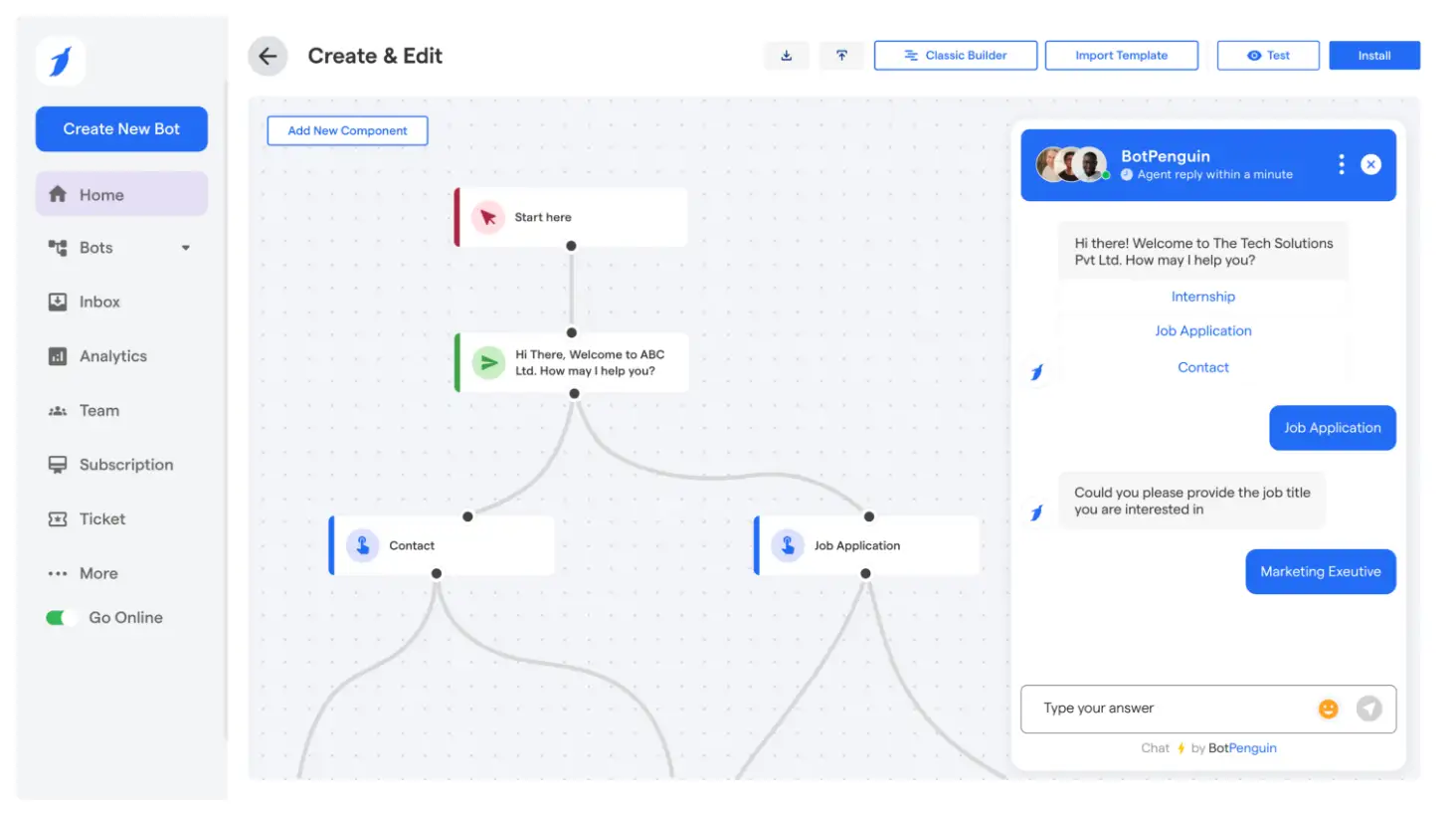
Businesses using WhatsApp and Viber aim for faster, smarter, and more meaningful customer communication. Managing both platforms manually can be inefficient as message volumes grow.
BotPenguin simplifies this by offering intelligent automation tools that deliver the combined strengths of WhatsApp automation and Viber-style engagement in one powerful platform.
1. Unified AI Communication Platform
BotPenguin comes with built-in AI Agents, AI Chatbots, and AI Voicebots that help businesses manage customer interactions from a single dashboard.
These tools handle lead qualification, FAQs, and customer assistance automatically, improving efficiency and ensuring every inquiry gets timely attention.
2. WhatsApp Automation at Its Best
BotPenguin helps businesses fully automate WhatsApp communication through the WhatsApp Business API. It supports auto-replies, message scheduling, promotional campaigns, and customer service workflows.
Example: A real estate agency can capture leads, book property visits, and send updates automatically using BotPenguin’s WhatsApp AI Chatbot, saving time and improving customer experience.
3. Smart Insights and Customization
The platform offers detailed analytics to measure message delivery, engagement rates, and response performance.
Businesses can customize chat experiences to fit their workflows, manage multiple teams, and scale communication without added complexity or cost.
BotPenguin combines the reach and automation power of WhatsApp with the engagement strategies often seen in Viber’s business messaging, powered by its native AI Agents, Chatbots, and Voicebots.
Try BotPenguin today to automate customer interactions, enhance efficiency, and deliver better communication experiences across every stage of the customer journey.
Conclusion
Both WhatsApp and Viber play crucial roles in modern business communication. WhatsApp remains the preferred choice for global enterprises that prioritize automation, verified communication, and scalability.
Its extensive user base and integration capabilities make it ideal for organizations managing high customer volumes across different markets.
Viber, on the other hand, thrives in regional engagement. It offers affordable outreach, community interaction, and creative branding features that suit small and mid-sized businesses focusing on specific geographies.
The best approach depends on your audience, cost structure, and communication goals. Businesses that want to maximize both reach and efficiency can use BotPenguin, an AI-powered platform that brings together automation, analytics, and intelligent customer interaction under one system.
It helps companies achieve the best of both worlds by combining reach with intelligent automation.
Frequently Asked Questions (FAQs)
What are the main Viber vs WhatsApp differences for business communication in 2025?
Viber focuses on regional marketing and affordability, while WhatsApp provides enterprise automation, CRM integration, and verified accounts for global communication efficiency.
How does WhatsApp for Business support better automation compared to Viber?
WhatsApp offers advanced automation using the Business API, enabling chat templates, message workflows, and CRM connections for faster and more structured business communication.
Why do companies choose Viber business marketing for regional engagement?
Viber helps businesses target regional audiences through personalized campaigns, public communities, and creative features like branded stickers and promotional messages.
Which platform ensures better security and privacy in WhatsApp vs Viber comparison?
Viber prioritizes GDPR-first privacy with limited data sharing, while WhatsApp ensures strong end-to-end encryption but collects metadata within Meta’s ecosystem.
Is WhatsApp or Viber better for business growth and customer communication?
WhatsApp supports scalable automation for global enterprises, while Viber benefits regional businesses seeking affordable outreach and higher engagement through interactive marketing campaigns.
How can BotPenguin improve WhatsApp automation and customer communication for businesses?
BotPenguin enhances WhatsApp automation with AI-powered chatbots, voicebots, and analytics, helping businesses manage conversations, automate workflows, and improve customer engagement efficiently.
